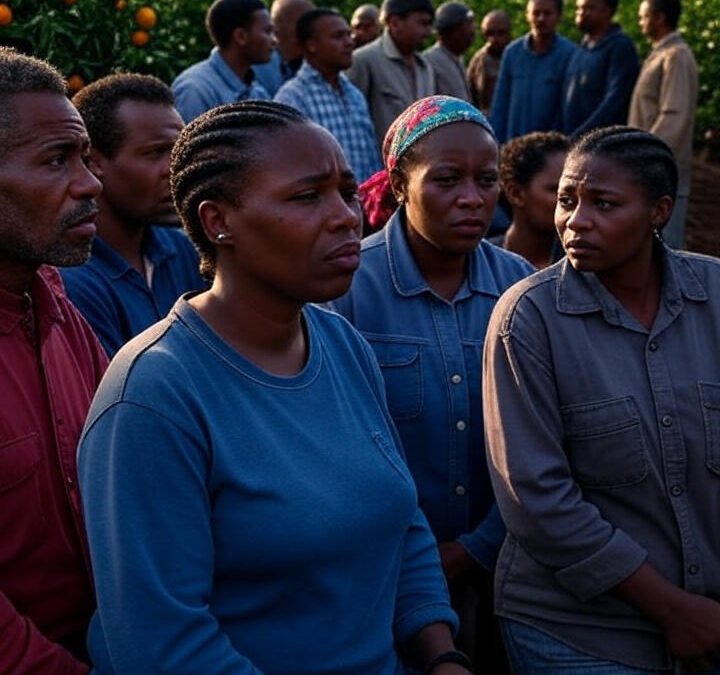How US Tariffs Might Hit South Africans Where It Hurts Most: Our Mental Health
Hey there, fellow South Africans. If you’ve been following the news lately, you’ll know that those new US tariffs – set to kick in from 1 August 2025 at a hefty 30% on most of our exports – are stirring up quite the storm. We’re talking about potential job losses in the tens of thousands, especially in agriculture, automotive, and manufacturing sectors. With our unemployment rate already sitting above 32%, this could feel like another punch to the gut for many families. But beyond the economic headlines, have you stopped to think about how this might affect our collective mental wellbeing? Let’s chat about it, because mental health is something we can’t afford to ignore in times like these.
First off, let’s recap the basics without getting too bogged down in the numbers. The tariffs are part of a broader US policy to tackle trade deficits, but for us, it means our exports – worth around R200 billion annually to the US – could take a serious hit. Sectors like citrus farming are bracing for the worst, with estimates suggesting up to 35,000 jobs at risk in that industry alone, particularly in rural spots like the Western Cape. Automotive could see 10,000 to 15,000 layoffs, mainly in the Eastern Cape and Gauteng, while metals, mining, and other manufacturing might add another 5,000 to 20,000 indirect losses. Overall, we’re looking at 50,000 to 100,000 potential job losses if things don’t pivot quickly, exacerbating issues in already vulnerable communities. That’s not just statistics; that’s real people – farmers, factory workers, and their families – facing uncertainty in an economy that’s still recovering from past shocks.
Now, here’s where it gets personal: unemployment doesn’t just empty your wallet; it can wreak havoc on your mind. Research from South Africa consistently shows that joblessness is strongly linked to higher rates of depression, anxiety, and even suicidal thoughts. For instance, people who are unemployed often report increased hostility, stress, anger, fear, despair, loneliness, and social isolation, alongside a sharp drop in self-esteem and life satisfaction. It’s like a vicious cycle – without a steady income, you might feel worthless or hopeless, which can lead to withdrawing from social circles and further deepening those feelings of isolation. In one study focusing on adult South Africans, severe depression or anxiety disorders were associated with significant reductions in earnings, highlighting how mental health and financial stability are intertwined.
Think about past economic shocks we’ve weathered, like the COVID-19 lockdowns or the global financial crisis. During the pandemic, adults who lost their jobs had notably higher depression scores compared to those who kept working, with effects lingering long after the initial lockdown. Economic downturns in general amplify these issues – a 1% rise in unemployment can correlate with a small but noticeable increase in mental health disorders, including physiological problems like hypertension or even higher risks of substance abuse. Here in South Africa, where poverty and inequality are already massive stressors, adding tariff-induced job cuts could compound things dramatically. Rural communities, hit hard by losses in citrus or mining, might see even worse outcomes because access to mental health services is often limited in those areas, leaving people to cope alone with overwhelming despair.
For young people and graduates, the impact could be particularly devastating. Unemployment in early career stages has been shown to lead to long-term vulnerability to psychological disorders, with reports of suicidal ideation, hopelessness, lack of self-confidence, and even violent behaviour in some cases. Imagine being a recent graduate, full of potential, only to face repeated rejections in a shrinking job market – that sense of failure can erode your mental resilience over time. Families aren’t spared either; strained relationships might arise as breadwinners grapple with feelings of inadequacy, potentially leading to higher instances of domestic issues or substance dependency as a misguided coping mechanism. And let’s not forget the broader ripple effects: economic insecurity has been unequivocally linked to increased depressive symptoms and suicide risk, costing our economy billions annually through lost productivity and healthcare burdens – estimates put unaddressed mental health conditions at around R161 billion a year.
It’s not all doom and gloom, though – or at least, we can hope for some resilience and proactive steps. The government is pushing for urgent negotiations with the US to seek exemptions or quotas, while also accelerating diversification of exports to places like Asia, the Middle East, and within Africa via the AfCFTA. If successful, this might soften the blow and create new opportunities down the line, potentially stabilising jobs in the medium term. On the mental health front, there’s growing awareness and support. Organisations like the South African Depression and Anxiety Group (SADAG) and the South African Federation for Mental Health are emphasising how economic stress ramps up symptoms like anxiety and depression, and they’re advocating for better workplace programmes, community interventions, and accessible helplines. For example, initiatives focusing on family resilience in the face of unemployment highlight the importance of social support networks, counselling, and skill-building workshops to rebuild confidence and foster hope.
At the end of the day, these tariffs aren’t just about trade balances – they’re about people’s lives, minds, and futures. If you’re feeling the weight of this uncertainty – whether it’s sleepless nights worrying about bills or a growing sense of isolation – remember you’re not alone. Reach out to friends, family, or professional helplines like SADAG’s toll-free numbers for confidential support. Building mental resilience now, through open conversations and community solidarity, could help us navigate this challenge. Let’s keep the dialogue going; after all, talking about mental health is the first step to protecting it. What do you think – how are you and your community preparing for this? Drop a comment below if you’re reading this on a blog!

